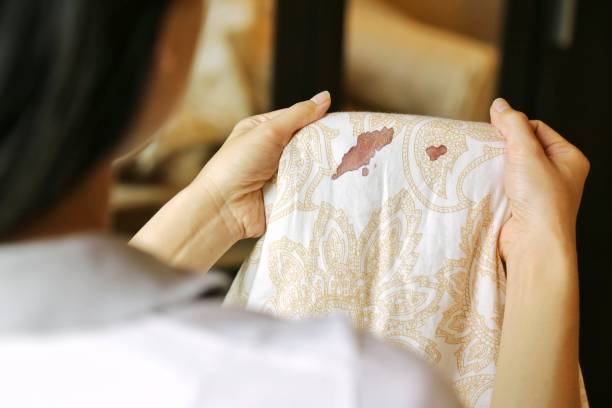10 Menstruation Myths Every Mother Should Discuss With Their Daughters
10 Menstruation Myths Every Mother Should Discuss With Their Daughters
Despite menstruation being a natural and common process, there are still many communities that hold misconceptions and outdated beliefs about it. For example, some believe that touching a pickle jar or preparing sushi during menstruation can spoil the food. Others think that entering a temple, bathing with family members, or drinking cow's milk during menstruation can have negative effects. In extreme cases, women are secluded in dark sheds away from others for the entire duration of their period.
These beliefs may sound absurd to many of us, but unfortunately, they are still prevalent in some parts of the world. Even in western countries, there are myths and misconceptions about menstruation that have been passed down through generations, perpetuating false beliefs and stigma.
Differentiating between fact and fiction is crucial in creating a safer and more informed environment for menstruation. By educating ourselves and our daughters about the facts, we can help dispel myths, promote clarity, and foster confidence. It is essential to challenge these misconceptions and work towards a world where menstruation is understood and accepted without stigma or discrimination.
MYTH NO. 1: MENSTRUATION IS DIRTY
The misconception that periods are dirty or impure is a widespread belief that manifests in various ways around the world. It can range from casual remarks of disgust when discussing periods to more extreme cultural practices. For instance, in western Nepal, the now-banned tradition of Chhaupadi mandated that menstruating individuals be isolated in sheds outside their homes because they were considered "impure."
In reality, menstruation is neither impure nor dirty; it is simply a natural bodily function. During a menstrual cycle, the body sheds the lining of the uterus, which includes some blood and extra tissue that was prepared for a potential pregnancy. When pregnancy does not occur, this lining is no longer needed and is expelled from the body.
It is important to challenge the notion that menstruation is dirty or impure and instead recognize it as a normal and healthy process. By promoting education and understanding, we can break down the stigma surrounding periods and create a more inclusive and informed society.
MYTH NO. 2: PERIODS SHOULD BE KEPT PRIVATE AND NOT DISCUSSED
Contrary to popular belief, menstruation is a natural and routine bodily function that occurs for many people. It is not something that should be shrouded in secrecy or taboo. Menstruation is not dirty, it does not hinder daily activities such as attending school or participating in sports, and it is not something mysterious or shameful.
Just like any other bodily function, periods do not need to be kept hidden or silenced. While it's understandable that some individuals may prefer to keep their personal matters private, it is important to challenge the notion that periods should be a source of shame. Open discussions and education about menstruation help break down stigmas and create a more supportive and inclusive environment for everyone.
By normalizing conversations about periods and promoting menstrual health education, we can empower individuals to embrace their bodies and eliminate the unnecessary shame and secrecy surrounding menstruation.
MYTH NO. 3: PERIODS SHOULD ALWAYS LAST ONE WEEK
It is important to understand that menstrual cycles can vary greatly from person to person. While some individuals may have periods that last around one week, it is perfectly normal for periods to be shorter or longer in duration. The commonly mentioned "28-day cycle" is just an average, and many women do not have consistently regular cycles.
Factors such as age, hormonal changes, stress, and underlying health conditions can influence the length and regularity of menstrual cycles. For young teens, it is common to experience irregular periods as their bodies are still adjusting and establishing a regular pattern. As women reach adulthood, a "regular" period can range from 21 to 35 days in length.
It is essential to recognize and respect the individual variations in menstrual cycles and not impose rigid expectations on the duration of periods. If you have concerns about the length or irregularity of your menstrual cycle, it is always advisable to consult with a healthcare professional for personalized guidance and support.
MYTH NO. 4: YOU LOSE A SIGNIFICANT AMOUNT OF BLOOD DURING YOUR PERIOD
Contrary to popular belief, the amount of blood lost during a menstrual period is often much less than commonly assumed. On average, women only lose about 2 to 3 tablespoons of blood during their period. Even for those who experience heavier bleeding, known as menorrhagia, the amount typically does not exceed 4 tablespoons.
It's important to note that heavy periods, while not necessarily indicating a problem, can be disruptive and may require medical attention. If you find yourself needing to change pads or tampons more frequently than every few hours, bleeding for an extended period of time (beyond seven days), or experiencing symptoms of anemia, it is advisable to consult with a healthcare professional.
They can evaluate your symptoms, assess any potential underlying causes, and provide appropriate guidance and treatment options to manage heavy menstrual bleeding effectively. Remember, seeking medical advice is important to ensure your well-being and address any concerns you may have about your menstrual health.
MYTH NO. 5: PERIOD BLOOD HAS A FOUL SMELL
It is a common misconception that period blood has a bad smell. In reality, menstrual blood itself does not have an odor. It is composed of blood and uterine tissue that sheds during menstruation. When exposed to the naturally occurring bacteria in the vagina and mixed with air, it may develop a slightly different scent, but it is highly unlikely that others can detect it. Have you ever been able to smell when someone else was on their period? Most likely not.
It's important to note that every person has their own unique scent, and vaginal odor can vary among individuals. The vagina has its own natural aroma that is influenced by factors such as diet, hygiene practices, and hormonal fluctuations. Contrary to what some advertisements may suggest, vaginas do not need to smell like flowers. Maintaining good hygiene by showering or bathing daily is generally sufficient.
However, if you notice a strong, fishy odor or any other unusual smell accompanied by itching, irritation, or unusual discharge, it may indicate an underlying issue such as a yeast infection or bacterial vaginosis. In such cases, it is recommended to consult with a healthcare professional for proper diagnosis and treatment. Remember, it's normal for the vagina to have its own scent, but any significant changes or concerning odors should be addressed by a medical professional.
MYTH NO. 6: PMS IS IMAGINARY OR PSYCHOLOGICAL
Premenstrual syndrome (PMS) is a real and common condition that affects many girls and women. It is characterized by a range of physical and emotional symptoms that typically occur one to two weeks before menstruation. These symptoms can include acne, bloating or weight gain, headaches, joint pain, food cravings, mood swings, depression, irritability, anxiety, and breast tenderness. They are believed to be influenced by the fluctuating levels of estrogen and progesterone during the menstrual cycle.
Gynecologists acknowledge that most girls and women will experience at least one PMS symptom every month. The severity and specific symptoms can vary greatly from person to person. PMS is not simply "all in your head," but a real physiological response to hormonal changes in the body.
It is important to recognize and address PMS symptoms as they can significantly impact a person's well-being and daily functioning. If you experience disruptive or distressing symptoms, it is advisable to consult with a healthcare professional who can provide guidance and suggest appropriate management strategies.
MYTH NO. 7: SWIMMING DURING YOUR PERIOD ATTRACTS SHARKS
Contrary to the myth that swimming during your period attracts sharks, there is no evidence to support this claim. Sharks are not specifically attracted to menstrual blood, and the amount of blood typically lost during a period is not significant enough to draw their attention.
In fact, swimming during your period is perfectly safe and should not be a cause for concern. When you are in the water, the pressure from the water can actually help prevent menstrual flow from entering the water. Additionally, using products like tampons or menstrual swimwear designed for periods can provide added protection against leakage.If you're truly concerned about shark attacks while swimming during your period, you can wear Beautikini's period swimwear.
It's important to remember that menstrual blood is a mixture of tissue, mucus, and a small amount of blood, and it is not considered unclean or unsanitary. Proper hygiene practices, such as using appropriate menstrual products and maintaining good personal care, can help ensure comfort and confidence while swimming or engaging in any water activities during your period.
MYTH NO. 8: PERIOD SYNCING AMONG FRIENDS IS REAL
Contrary to popular belief, there is no scientific evidence to support the idea that menstrual cycles sync up among friends or people who spend a significant amount of time together. A study conducted a few years ago debunked the notion of period syncing, revealing that variations in cycle lengths are more likely the reason why some individuals may find themselves menstruating at the same time as their friends.
While the idea of period syncing can be intriguing and even fun to think about, it is important to rely on scientific evidence. The timing of menstrual cycles is influenced by individual hormonal patterns and not by external factors like the moon or proximity to other menstruating individuals.
Understanding the facts about menstrual cycles can help dispel misconceptions and promote accurate information about this natural bodily process.
MYTH NO. 9: AVOID EXERCISE DURING YOUR PERIOD
Contrary to popular belief, there is no need to avoid exercise during your period. In fact, engaging in physical activity can be beneficial and help alleviate symptoms associated with PMS (premenstrual syndrome) and menstrual cramps. Exercise increases blood flow and oxygen supply to the muscles, which can help reduce discomfort and promote overall well-being during this time.
Listening to your body and choosing exercises that you feel comfortable with is important. Light to moderate exercises such as walking, swimming, yoga, or low-impact aerobics can be excellent choices. However, if you experience severe pain or discomfort, it's advisable to consult with your healthcare provider for personalized advice.
Remember, staying active and maintaining a healthy lifestyle can contribute to better menstrual health and overall well-being throughout your cycle.
MYTH NO. 10: TALKING TO YOUR DAUGHTER ABOUT PERIODS BEFORE SHE STARTS WILL SCARE HER
Contrary to this myth, open and supportive communication about periods with your daughter before she starts menstruating is crucial and can actually alleviate fear and anxiety. By providing her with accurate information and addressing any questions or concerns she may have, you can empower her to navigate this natural process with confidence and understanding.
Starting the conversation about puberty and periods at an early age, typically in the primary school years, allows for gradual and age-appropriate education. This ongoing discussion helps normalize menstruation and prepares your daughter for the physical and emotional changes that accompany it.
By introducing her to period-related products, such as Beautikini Pre-period undies, you can help her feel more comfortable and prepared when her first period arrives. These specialized underwear can provide peace of mind and eliminate worries about potential leaks.
Remember, open and supportive communication fosters a healthy attitude towards menstruation and equips your daughter with the knowledge and tools she needs to manage her periods confidently.
If your teenager is at an appropriate age, it is important to have open and honest discussions about sexual relationships. Addressing misconceptions about pregnancy and periods is a crucial part of this conversation. While it is less likely to get pregnant during your period, it is still possible. Ovulation can be unpredictable, and menstrual cycles can vary in length.
By providing accurate information about reproductive health and emphasizing the importance of contraception, you can help your teen make informed decisions and understand the potential risks associated with sexual activity at any time during their menstrual cycle.
Encouraging responsible sexual behavior, including the use of contraception to prevent unintended pregnancies, is essential for their overall well-being and future reproductive health.

















































































































Leave a comment
Please note, comments need to be approved before they are published.